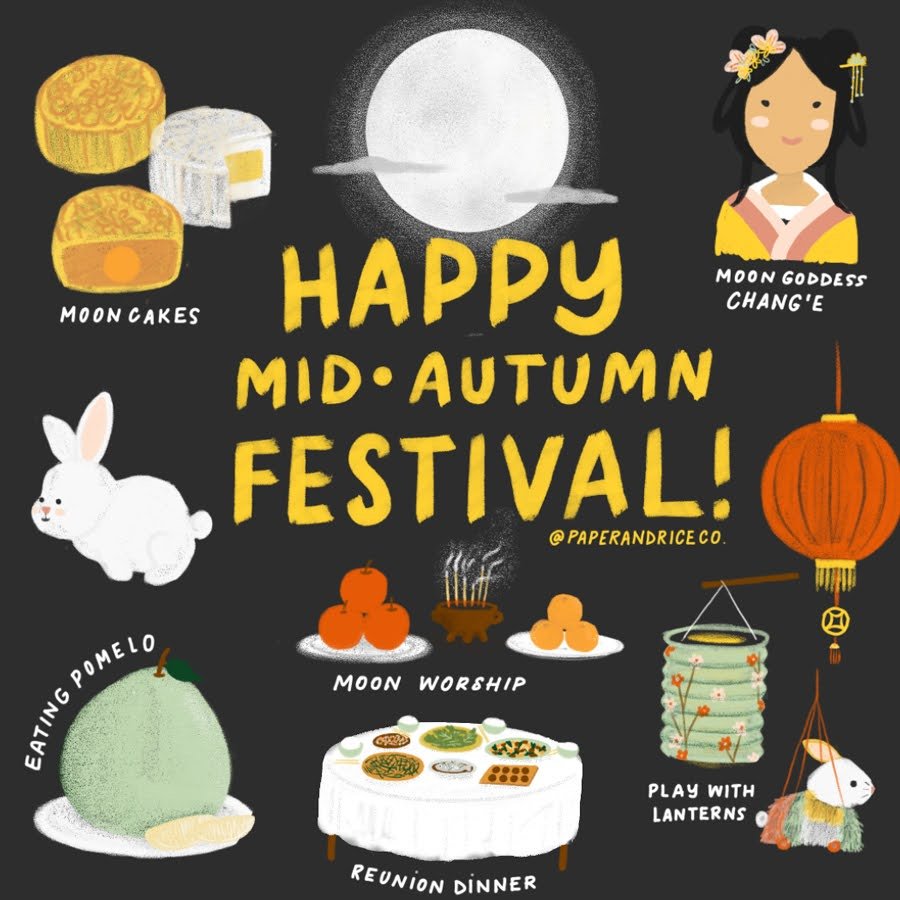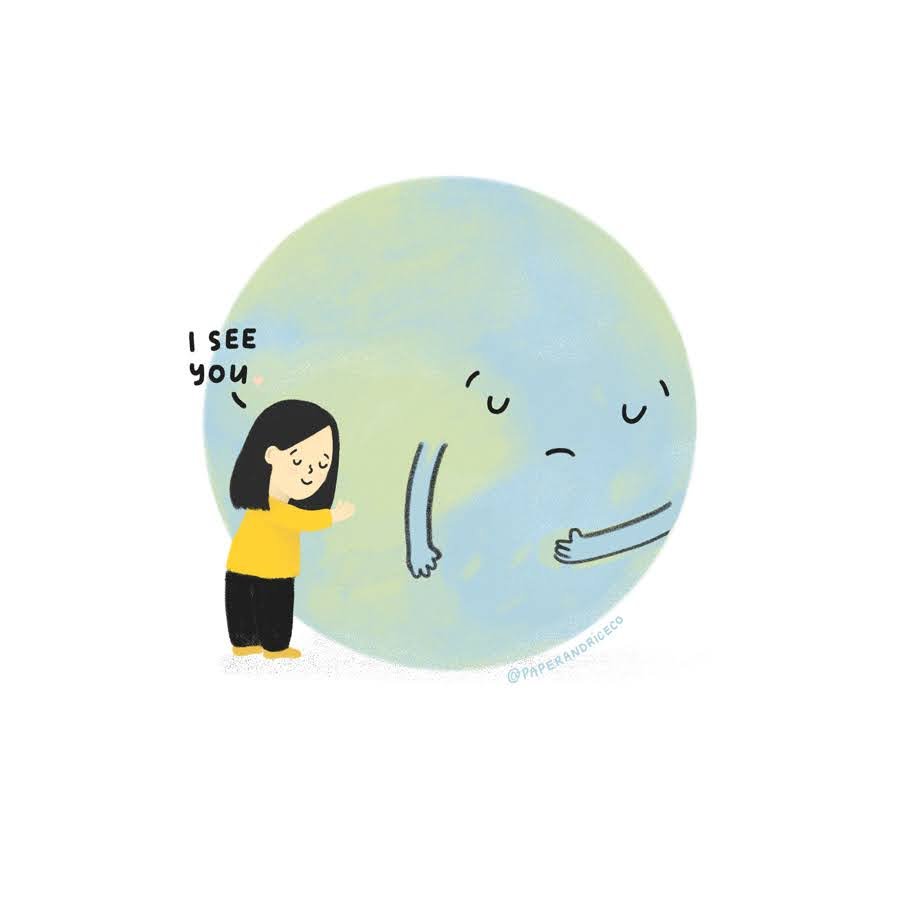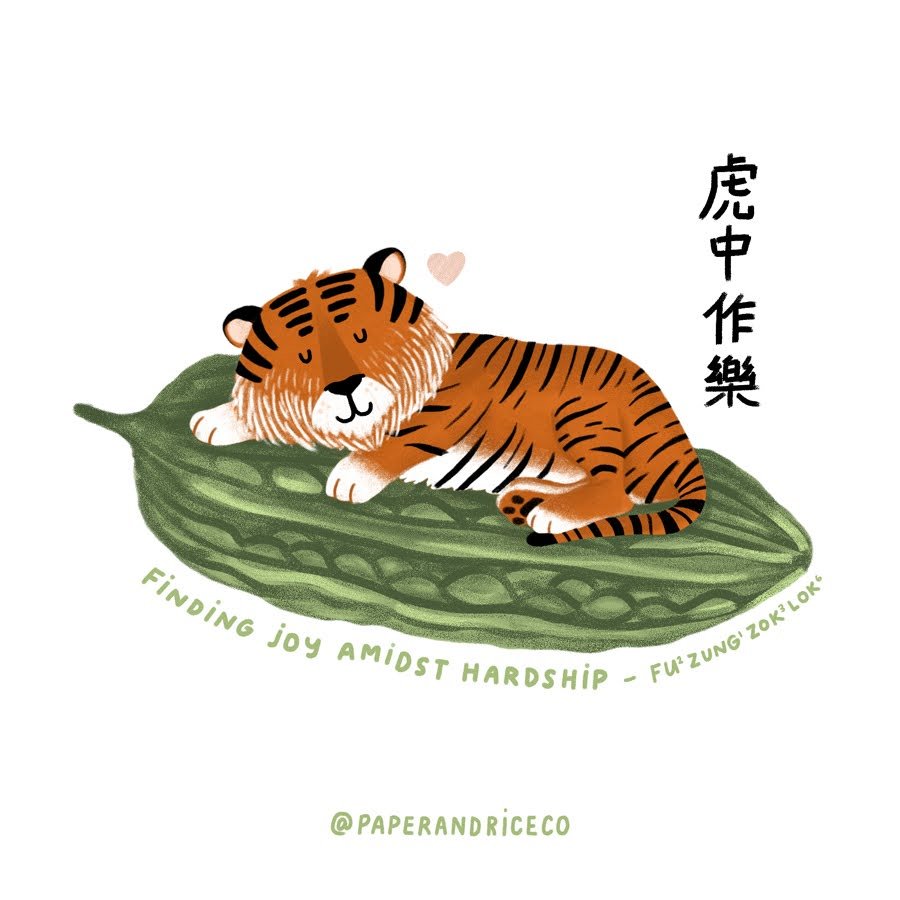An Interview with Vivian Yu
Aimee Resnick (she/her) - February 14, 2024
Vivian Yu is the founder, designer and the face behind Paper and Rice Co., which creates handcrafted greeting cards and stickers that celebrate Asian culture. Paper and Rice Co. officially started on May 1st, 2020, coinciding with Asian Heritage Month. Inspired by her heritage, Yu seeks to create cards that evoke “a feeling of home, comfort, nostalgia and an emotional connection.” Spreading joy far and near and connecting to our culture with one card at a time. This week, we sat down to discuss Asian Joy, religious school, and the four flavors of life.
NAR: You’ve previously written that your stationary evokes a “feeling of home.” Where (and what) is home to you?
Paper and Rice Co.: It’s where I feel most like myself; where my heart feels warm, safe, and content. It's not just a place, it can be with the people I’m emotionally connected with. Even though I've never lived in Hong Kong, where my family is from, I still feel a strong bond with the city, and it feels like home when I visit. Home is like roots, and it can spread, reroot, and adapt to various locations and conditions. It should always bring you comfort and familiarity, like an unspoken connection with a dear friend who makes you feel at peace.
NAR: Each of your cards, stickers, and prints tells a story of Asian Joy. What does Asian Joy mean to you?
Paper and Rice Co.: Asian joy to me means being unapologetic for my Asianness, embracing happiness as an act of resistance, and being surrounded by community. It’s a feeling that radiates from the heart and is experienced in various ways, such as reliving a cherished memory captured through art, ordering a dish my grandmothers used to make, and watching fellow Asians find happiness in their passions.
NAR: What is your single favorite tradition?
Paper and Rice Co.: I love the reunion dinners that occur a few times a year, such as the Mid-Autumn Festival and Lunar New Year. It's like our Thanksgiving dinner. We prepare symbolic dishes and practice traditional customs. It's not just a feast but a cherished tradition that brings a sense of warmth and belonging and reconnects us with our ancestors and family.
NAR: Tell us about your grandmother. What does she mean to you?
Paper and Rice Co.: Growing up, I had two grandmothers— Ah Ngin and Por Por (paternal and maternal words for grandmother in Toishanese and Cantonese, respectively), who I saw as gentle, unconditionally loving versions of my parents. Only when I was older I recognized how truly special they were. After my Ah Ngin passed away, I realized I didn't know her well. I didn't want to make the same mistake with my Por Por, so I started documenting her life stories. Thankfully, she has an incredibly detailed memory and is always willing to share them. I'm grateful I did this before her memory started declining.
Por Por turned 106 this year! Like many in her generation, Por Por lived through harrowing experiences, such as the Sino-Japanese War, Cultural Revolution, and famine, yet she has a great sense of humor and playfulness, full of empathy, and loves to learn— she never went to school — and reminds us we never stop learning, even at 100 years old. We have a bond that comes from a place of trust, and we'd share stories, gossip, and talk about our favorite coffee and chicken wings. We also find comfort and humor in venting about our families together.
NAR: In a recent post, you wrote about being sent to a Saturday/Sunday Chinese school as a child. My parents forced me to participate in a similar program that taught Hebrew and Jewish culture: like you, I despised it but now recognize its virtues as an adult. What is your most vivid Chinese School memory? How can we most effectively carry culture and tradition across generations?
Paper and Rice Co.: My most vivid memory wasn’t my proudest: I was caught cheating on a test with my friend. I was in survival mode and only doing enough to get by. Most of us at that age didn’t understand the importance of learning our mother tongue. Plus, we faced pressure to excel at our regular school and fit into Western culture, so we didn't think learning anything at Chinese school mattered. I’m indifferent about that experience, but I appreciate being able to write and read some Chinese.
Kids in my generation had different attitudes toward their cultures. Some embraced it, while others rejected it due to their upbringing, environment, and racial trauma, which made them feel ashamed of their cultural identities. It's crucial to foster an environment that sparks curiosity and interest. Coercing children to learn about their culture and follow strict traditions may be counterproductive. Instead, an empathetic approach that presents learning and practices in a fun, inclusive, and engaging way is more effective.
NAR: What was your career before Paper and Rice? What sparked you to start your own small business?
Paper and Rice Co.: I studied graphic and web design, which I still sometimes do on the side. I was about to turn 30 when I thought of my idea. I had been struggling to find my purpose in the creative industry and often felt like I was conforming to what others wanted. Since childhood, I've always been obsessed with stationery and greeting cards, and I noticed a lack of Asian representation in the greeting card market. I launched my business after years of overcoming my self-doubt and fears. My immigrant parents ran a restaurant, so I know the hardship of entrepreneurship. In hindsight, I wish I had started earlier, but things happen at their own pace. I didn't plan to launch my website during a despairing time when Asians were facing hate and violence due to COVID-19, but it made my purpose clear - to spread joy and laughter through my creativity and bring positivity to the community.
NAR: Tell us about your sustainable packaging. What is the role of small businesses in creating systemic change?
Paper and Rice Co.: My cards and envelopes are made from recycled paper, packaged modestly in plant-based cello sleeves and shipped in kraft mailers. I repurpose used shipping and packaging material too. My supplies are mainly sourced from Canadian companies to minimize transportation time and support the local economy. However, there's still room for improvement. It's vital to be a mindful business owner. As we see today, our actions have irrevocable damage on the environment, and large corporations are the biggest contributors. Whether you're planning a business now or have been running one for 30 years, our social responsibilities shouldn't be an afterthought. We must ask ourselves how we can be better at minimizing carbon footprint and waste. Of course, there are limitations like costs and availability, but we have to make those choices. Sustainability also includes intentional design— products with purpose and longevity.
NAR: In a previous interview, you shared your intention to “spread awareness, honour and demystify my culture” to combat anti-Asian hate. How does education eliminate exclusion? That is, to what extent does understanding the culture of others reduce racism?
Paper and Rice Co.: I remember a day at elementary school when we had a cultural exchange of food and traditions. I was thrilled to share mine and learn about all the diversity. I realized that everyone's differences make us unique and exciting, not something to be scared of. That's why I love traveling and sharing my culture through my creative work online. Although the work can feel like a burden, I make sure to have fun with it and keep it genuine. Knowing that I might be changing someone's view and adding to their knowledge is a motivator. Cultural learning and understanding have no limits; there's always more to discover as people and cultures evolve. It keeps us engaged, curious, and empathetic. Education and exposure are crucial to developing skills to understand and respect someone's way of life and choices. They eliminate preconceived ideas and biases about a group because we know where they are coming from.
NAR: 2023 marks the hundredth year since the passing of the Chinese Exclusion Act in Canada. Today, anti-Asian sentiment voraciously persists across Canada. What can Americans do to be active allies for Canada’s Asian community?
Paper and Rice Co.: They need first to acknowledge their privilege and examine their prejudices. Without placing the burden on Asians, they have to prepare to do the homework themselves. An ally takes the time to learn, listen, and understand the history, culture and challenges faced by the Asian community. Being an ally involves speaking up for Asians in their absence, having uncomfortable conversations with friends, family, coworkers, and pointing out ignorance and bigotry. Engage in meaningful discussions with Asians and ask what they need. Use privilege to advocate systemic change. They can vote with their money, donate to Asian organizations, fund Asian-led projects, and shop at Asian-owned businesses. This form of allyship applies to everyone and to all marginalized groups.
NAR; You have a story on your Instagram called “WTF” where you call out problematic anti-Asian sentiments. What is your advice about becoming a responsible online activist?
Paper and Rice Co.: Activism work comes in various forms, but it shouldn't be intimidating. Be prepared to deal with many emotions, know your capacity and set limits. It gets lonely and burdening, especially when there's silence and apathy, and anger can get out of control. I'm learning to balance it with compassion to keep me hopeful. It also helps to follow activists and community organizers to stay motivated. When I experience burnout, I use coping mechanisms to rest and recharge, like staying offline, making room for joy, and talking to my friends and community. Activism requires resilience. It's easy to be discouraged and quit, especially if you're not on the front lines of the issues, but remember, it's a long-term fight, so be gentle on yourself, and it's okay to rest.
NAR: I loved your print about the four flavours of life. Explain the four flavors to us. Which do you find yourself occupying most frequently?
Paper and Rice Co.: "Life is sweet, sour, bitter, spicy" is a Chinese idiom that compares the ups and downs of life to the four flavors. After the Atlanta spa shooting in 2021, I was caught in an emotional cyclone. The phrase reminded me that to experience life fully, we must learn to embrace the highs and lows. Every emotion is an asset to our growth. Sweet is obviously the most desired as it represents happiness; sour is sad, which helps us build compassion; bitter is resentment, which is undesirable but necessary for change; and spicy is anger, which is fueling. If we only seek sweetness, we remain complacent, in our comfort zone, never letting change happen. That's why I frequently occupy spicy because anger keeps me motivated and passionate.
NAR: So many of your cards center around delicious-looking foods. What’s your favorite dish?
Paper and Rice Co.: This is the most challenging question you asked! My favorite dish has to be my mom's Cantonese soups. They're called Lo Foh Tong (low-heat/slow simmering soup), and it's uniquely engrained in the culture. Specific combinations of ingredients are simmered for hours, bringing out the deep flavor profiles and nutrition, offering healing benefits for any ailment. Literally, it's a soup for the soul.
Please note: this interview has been edited for length and clarity.







